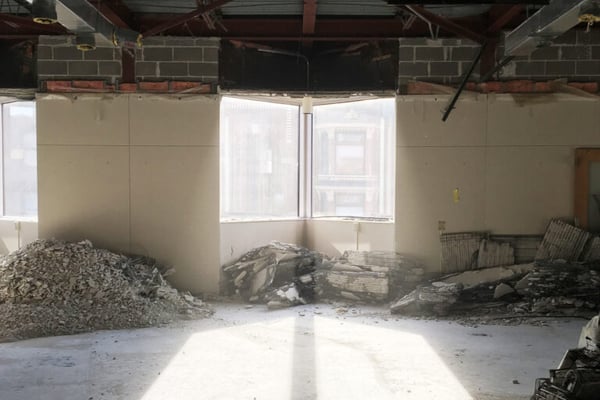When it comes to construction, we believe in setting realistic expectations with our clients and preemptively addressing problems that may arise.
This article will help you prepare for the construction process by discussing five factors that can delay a construction timeline, including:
- Labor and supply chain issues
- Scope changes
- Lack of planning in the design phase
- Weather
- Communication problems
By the end of the article, you will better understand the hurdles you may encounter during construction and how you and your team can prepare.
5 Problems that Delay Construction Timelines
1. Labor and Supply Chain Issues
Like other industries, the construction industry has been impacted by Covid-19. Labor and supply chain shortages are becoming a common problem on many construction projects, leading to delayed timelines.
Supply chain shortages can also cause unexpected cost escalations for materials. Your architect will plan for escalation during the design phase of your project, but in a volatile market, price increases can be hard to predict. Depending on your project, price escalation can negatively affect your timeline.
While these situations are beyond anyone’s control, you can prepare by factoring contingencies into your budget, planning alternates, and adjusting your schedule expectations.
Learn more by reading our guide to preparing for an uncertain building materials market.
2. Scope Changes
Changes to the project’s scope can also delay a construction timeline. Several problems can lead to scope changes, including unexpected situations during construction and errors or omissions in contract documents. Your architect should try to prevent these situations by implementing quality assurance strategies and performing pre-design research.
However, owner-requested change orders can also impact construction schedules. Ideally, you will make all changes in the early phases of the design process.
Change is easy in Schematic Design and Design Development, but as the architectural process progresses, changes are more likely to impact your schedule. Agreeing to a final design before the Construction Documents phase of your project is the best way to stay on course.
3. Lack of Planning in the Design Phase
As mentioned, unexpected situations during construction can also delay the timeline. For example, at the start of a renovation project, the contractor may discover you need additional abatement services, delaying the timeline.
Preliminary research into the site or existing building can prevent these situations. To get a thorough understanding of your site’s conditions, your architect should perform pre-design research and consult structural and MEP engineers when necessary.
This research may lengthen the design process, but it will save you time later. With an awareness of potential problems, you can adjust your schedule and protect your budget.

On renovations, preliminary research on the existing building can prevent costly construction delays.
4. Weather
No matter the location, inclement weather is sure to impact your construction timeline. Cold and wet conditions can impede your contractor’s ability to complete the project on time.
Unfortunately, weather conditions are beyond anyone’s control. If your construction schedule spans several seasons, be prepared for some weather-related delays.
5. Communication Problems
Communication problems can have the greatest impact on your construction timeline. Fortunately, these problems are some of the most preventable.
Efficient communication should begin the design phase of your project. Your architectural project manager will be your main point of contact, and they will recommend you establish a primary contact on your end, streamlining communication.
Depending on your project delivery method, your architectural project manager will remain your main point of contact during construction. Your contractor will communicate with your project manager, and your project manager will relay messages to you and your team.
Before construction begins, you should create a plan for addressing submittals and change orders. The building owner has the final say on these documents, so prepare by establishing an efficient review and approval process. With processes in place, you are more likely to stay on schedule.
Create Contingency Plans
No construction process is perfect, and your architect should work to protect your schedule and budget. Before construction begins, they will recommend setting aside a construction contingency to cover the cost of any unexpected situations.
But contingency plans extend beyond your budget. You should also have a plan in place for time and human resources. Make sure you have time in your schedule to handle delays and the resources to handle submittals, change orders, or any problems that may arise.
Give yourself the greatest chance of success by creating an internal plan for the construction process.
Ready to Learn More?
Many factors can delay a construction timeline. Some factors like supply chain issues and inclement weather are beyond anyone’s control. Other factors are preventable. Through pre-design research and efficient communication, you can give yourself the greatest chance of success.
Now that you better understand how to protect your schedule during construction, read how you can prevent cost overruns. To learn more about our approach, contact us, and schedule a call with an architect.
